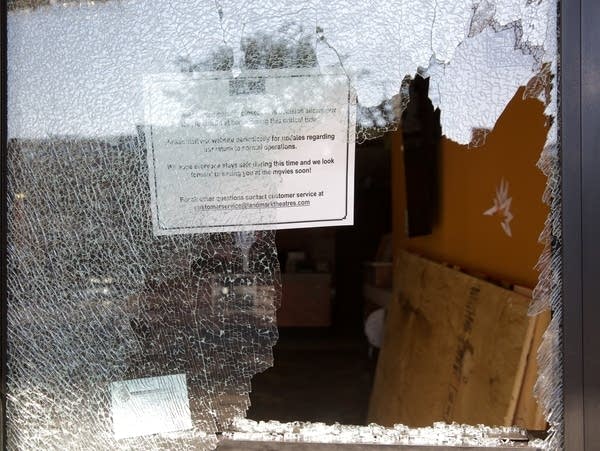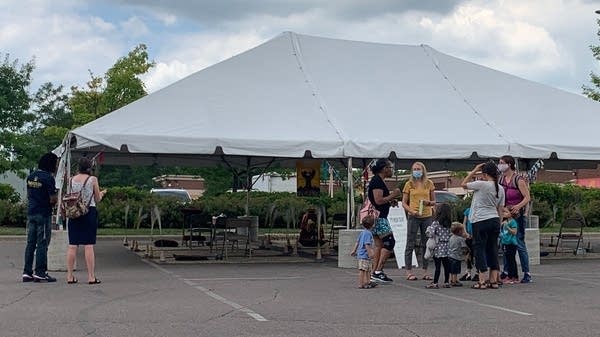Twin Cities crime task force may continue past its end date as gun violence persists

Go Deeper.
Create an account or log in to save stories.
Like this?
Thanks for liking this story! We have added it to a list of your favorite stories.
The Twin Cities Violent Crime Task Force was supposed to last one month. It’s already halfway done but its leaders are considering extending the effort.
The task force made up of federal, state and city law enforcement agencies aims to identify who is behind an extraordinary spike in gun violence — but they have not been able to curb it.
In a parking lot on the busy corner of West Broadway Avenue and Bryant Avenue in north Minneapolis, a grassroots effort to bring 30 days of healing is coming to an end.
Two large white tents make space for anybody who wants to come by and pray for peace and an end to gun violence that has shocked those who’ve lived in the Twin Cities for decades.
Turn Up Your Support
MPR News helps you turn down the noise and build shared understanding. Turn up your support for this public resource and keep trusted journalism accessible to all.

“It feels like I’m on pins and needles, all the time,” said Audua Pugh, who chairs the nonprofit Jordan Area Community Council. Cathy Spann, the council’s executive director said even a space set up for prayer has echoed with the sound of gunshots.
“I’m calling the 4th Precinct inspector saying can we get a camera over here, we’re calling the police because there were gunshots over here, there were drug dealers selling drugs over here,” Spann said.
Across the city of Minneapolis, there have been 37 homicides so far this year. That’s double the number of killings that happened by this time last year.

So earlier this month, Minnesota U.S. Attorney Erica MacDonald decided to convene the Twin Cities Violent Crime Task Force to help.
“We’re not flooding the streets with law enforcement, we’re not targeting certain communities, we are going after shooters,” MacDonald said.
The effort includes members of a dozen local, state and federal law enforcement agencies working out of one secret location. They focus on intelligence, tracking everything from guns to social media posts.
“If we seize phones to be able to get that information off phones, it’s incredible the amount of information people will post about their criminal wrongdoing on their Insta[gram] or Snap[chat] or Facebook and to be able to get that information and get it out to streets in real time has been remarkable in their ability to respond,” MacDonald said.
Tom Perzichilli, acting assistant special agent in charge of the FBI’s Minneapolis field office, said the task force helps prevent doubling up on work between agencies. The goal is to speed up DNA testing on guns, and hopefully, more prosecutions.
“Typically, in those instances, those felony possession of firearms are really important, especially in light of the uptick in violence we have seen and the shootings and the murders,” Perzichilli said.
So far, the task force reports its efforts have led to 68 arrests, 80 firearms seized and 16 state and federal cases charged. Agencies on the task force include the Minnesota Bureau of Criminal Apprehension, the Minneapolis and St. Paul police departments and sheriffs’ offices from Hennepin, Ramsey and Dakota counties.
MacDonald said the task force is seeing some common threads, but no one organization behind the violence.
“We are seeing loosely associated groups, that are not solidified into one gang but they are settling their social media beefs on the streets with firearms, and that is 100 percent what we are seeing not only in Minnesota but nationally,” the U.S. attorney said.
The task force says it consulted with some Minneapolis clergy members and community leaders before launching the task force.
Spann hadn’t heard much about the task force efforts. She feels no safer in the past two weeks.
The future of the Minneapolis Police Department does concern her. On top of that, there’s additional stress around the ongoing coronavirus pandemic and the civil unrest after the police killing of George Floyd that left many businesses damaged and closed.
Minneapolis City Council members have called for the dismantling of the Minneapolis Police Department in favor of a more holistic approach to violence prevention. They want to put the measure before voters in November. Spann is skeptical.

“I think you need a system that encompasses a holistic approach to policing not punitive measurements,” Spann said. “But I don’t see a plan of action from our city that says this is what policing the city of Minneapolis will look like in three years and five years.”
Last week, the Minneapolis City Council voted to put more than $1 million toward the Office of Violence Prevention to set in motion a Cure Violence model. That includes building teams of outreach workers to identify and mediate potentially violent conflicts and help ensure that conflicts do not reignite.
MacDonald said the Twin Cities Violent Crime Task Force, which is supposed to last one month, will continue until it can track the statistics and see that violence is going down and not continuing to spike.
The Jordan Area Community Council’s Spann suggests at least six months of help from the task force based on the critical need.
“Don’t play with my life, don’t play with the life of community members, don’t play with my neighbors’ lives,” Spann said. “Don’t play with us.”



